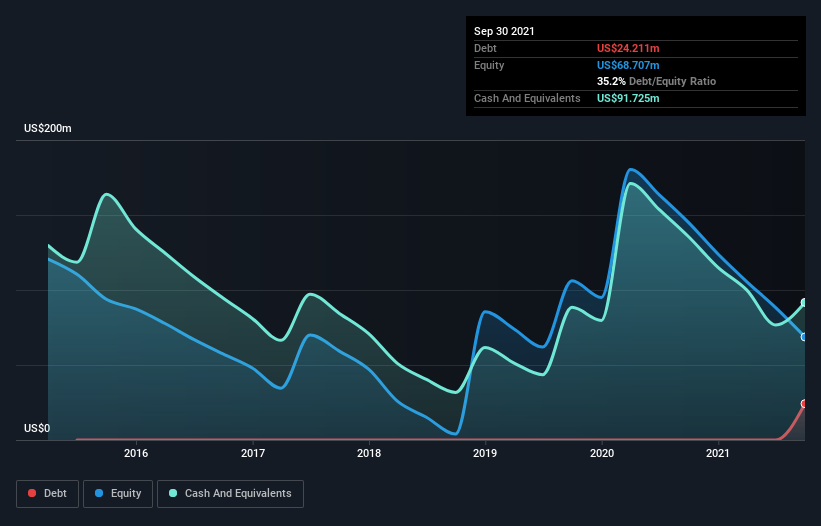Is ZIOPHARM Oncology (NASDAQ:ZIOP) Weighed On By Its Debt Load?
David Iben put it well when he said, 'Volatility is not a risk we care about. What we care about is avoiding the permanent loss of capital.' When we think about how risky a company is, we always like to look at its use of debt, since debt overload can lead to ruin. We note that ZIOPHARM Oncology, Inc. (NASDAQ:ZIOP) does have debt on its balance sheet. But should shareholders be worried about its use of debt?
What Risk Does Debt Bring?
Debt and other liabilities become risky for a business when it cannot easily fulfill those obligations, either with free cash flow or by raising capital at an attractive price. If things get really bad, the lenders can take control of the business. However, a more frequent (but still costly) occurrence is where a company must issue shares at bargain-basement prices, permanently diluting shareholders, just to shore up its balance sheet. Of course, plenty of companies use debt to fund growth, without any negative consequences. The first thing to do when considering how much debt a business uses is to look at its cash and debt together.
See our latest analysis for ZIOPHARM Oncology
What Is ZIOPHARM Oncology's Debt?
The image below, which you can click on for greater detail, shows that at September 2021 ZIOPHARM Oncology had debt of US$24.2m, up from none in one year. However, its balance sheet shows it holds US$91.7m in cash, so it actually has US$67.5m net cash.
A Look At ZIOPHARM Oncology's Liabilities
According to the last reported balance sheet, ZIOPHARM Oncology had liabilities of US$28.2m due within 12 months, and liabilities of US$16.9m due beyond 12 months. Offsetting this, it had US$91.7m in cash and US$1.51m in receivables that were due within 12 months. So it can boast US$48.2m more liquid assets than total liabilities.
It's good to see that ZIOPHARM Oncology has plenty of liquidity on its balance sheet, suggesting conservative management of liabilities. Due to its strong net asset position, it is not likely to face issues with its lenders. Simply put, the fact that ZIOPHARM Oncology has more cash than debt is arguably a good indication that it can manage its debt safely. There's no doubt that we learn most about debt from the balance sheet. But it is future earnings, more than anything, that will determine ZIOPHARM Oncology's ability to maintain a healthy balance sheet going forward. So if you want to see what the professionals think, you might find this free report on analyst profit forecasts to be interesting.
Since ZIOPHARM Oncology doesn't have significant operating revenue, shareholders may be hoping it comes up with a great new product, before it runs out of money.
So How Risky Is ZIOPHARM Oncology?
We have no doubt that loss making companies are, in general, riskier than profitable ones. And we do note that ZIOPHARM Oncology had an earnings before interest and tax (EBIT) loss, over the last year. Indeed, in that time it burnt through US$70m of cash and made a loss of US$90m. While this does make the company a bit risky, it's important to remember it has net cash of US$67.5m. That means it could keep spending at its current rate for more than two years. Overall, its balance sheet doesn't seem overly risky, at the moment, but we're always cautious until we see the positive free cash flow. When analysing debt levels, the balance sheet is the obvious place to start. But ultimately, every company can contain risks that exist outside of the balance sheet. For example, we've discovered 3 warning signs for ZIOPHARM Oncology (1 is potentially serious!) that you should be aware of before investing here.
If, after all that, you're more interested in a fast growing company with a rock-solid balance sheet, then check out our list of net cash growth stocks without delay.
Have feedback on this article? Concerned about the content? Get in touch with us directly. Alternatively, email editorial-team (at) simplywallst.com.
This article by Simply Wall St is general in nature. We provide commentary based on historical data and analyst forecasts only using an unbiased methodology and our articles are not intended to be financial advice. It does not constitute a recommendation to buy or sell any stock, and does not take account of your objectives, or your financial situation. We aim to bring you long-term focused analysis driven by fundamental data. Note that our analysis may not factor in the latest price-sensitive company announcements or qualitative material. Simply Wall St has no position in any stocks mentioned.

